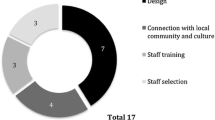Abstract
Language policies in South African higher education were formalized between 2000 and 2002, just prior to a major restructuring of the higher education system. During this period institutions of higher learning were expected to formulate both a language policy and a detailed language plan. National policies on language in education are intended to substantiate the constitutional commitment to using and developing the 11 official languages. Gaps between official commitments to ‘multilingualism’ and actual language practices are nevertheless evident at national and institutional levels. In this article I explore the concepts ‘bilingual university’ and ‘academic bilingualism’, as a prelude to a contextualized discussion of the decline of English-Afrikaans bilingualism at the University of Port Elizabeth (which after the January 2005 merger with the PE Technikon, became part of the Nelson Mandela Metropolitan University). I explore the emergence of a gap between formal policy pronouncements and actual institutional practices. I then situate this local trend within the wider context of post-1994 political and socio-economic changes and the emergence of a new official discourse on ‘multilingualism.’ I explain the ostensive shift from a ‘dual medium’ to a ‘multilingual’ policy at UPE in terms of broader trends and contradictions in the national field of higher education. The article employs a theoretical framework, which—drawing on the work of Bourdieu—seeks to (a) situate the case within a wider national field of higher education, and (b) theorise ‘academic bilingualism’ as form of cultural capital within this field. In terms of this framework, the analysis of the case raises specific questions about current institutional language policies in South Africa and more general questions about the nature of bilingualism in higher education.
Similar content being viewed by others
Abbreviations
- ANC:
-
African National Congress
- BPLS:
-
Board of Public Examiners in Literature and Science
- NCHE:
-
National Commission on Higher Education
- NECC:
-
National Education Coordinating Committee
- NMMU:
-
Nelson Mandela Metropolitan University
- NP:
-
National Party
- PanSALB:
-
Pan South African Language Board
- UCGH:
-
University of the Cape of Good Hope
- UNISA:
-
University of South Africa
- UPE:
-
University of Port Elizabeth
References
Anckar, O. (2000). University education in a bilingual country: The case of Finland. Higher Education in Europe, XXV, 499–506.
Beillard, J.-M. (2000). Bilingualism in a Canadian context: The case of the University of Ottawa. Higher Education in Europe, XXV, 469–476.
Boucher, M. (1973). Spes in arduis: A history of the University of South Africa. Pretoria: University of South Africa.
Bourdieu, P. (1986). The forms of capital. In J. G. Richardson (Ed.), Handbook of theory and research for the sociology of education. New York: Greenwood Press.
Bourdieu, P. (1991). Language and symbolic power. Cambridge: Polity Press.
Bourdieu, P. (1999). Structures, habitus, practices. In A. Elliott (Ed.), Blackwell reader in contemporary social theory. Malden: Blackwell.
Brink, C. (2006). No lesser place—The taaldebate at Stellenbosch. Stellenbosch: Sun Press.
du Plessis, T. (2006). From monolingual to bilingual higher education: The repositioning of historically Afrikaans-medium universities in South Africa. Language Policy, 5, 87–113.
Giliomee, H. (2001). Die taal- en kulturele uitdagings van die histories Afrikaans universiteite. In H. Giliomee & L. Schlemmer (Eds.), Kruispad—Die toekoms van Afrikaans as openbare taal. Cape Town: Tafelberg.
Hartshorne, K. B. (1987). Language policy in African education in South Africa, 1910–1985, with particular reference to the issue of medium of instruction. In D. Young (Ed.), Bridging the gap between theory and practice in English second language teaching. Cape Town: Maskew Miller Longman.
Haugen, E. (1983). The implementation of corpus planning: Theory and practice. In J. Cobarrubias & J. A. Fishman (Eds.), Progress in language planning: International perspectives (pp. 269–289). Berlin: Mouton.
Hill, L. (2008). Language and higher education in South Africa. PhD thesis, University of Warwick.
Jernudd, B. H. (2002). Managing languages at bilingual universities: Relationships between universities and their language environment. In L. Wei, J.-M. Dewaele, & A. Housen (Eds.), Opportunities and challenges of bilingualism (pp. 297–310). Berlin: Mouton de Gruyter.
Langner, M., & Imbach, R. (2000). The University of Freiburg. Higher Education in Europe, XXV, 461–509.
Laponce, J. A. (1987). Languages and their territories. Toronto: University of Toronto Press.
Purser, L. (2000). The bilingual university—General reflections on its origins, mission, and functioning. Higher Education in Europe, XXV, 452–459.
Rautenbach, T. C. (1995). Die stigting en aanvangsjare van die Universiteit van Port Elizabeth. Port Elizabeth: Department of History, University of Port Elizabeth.
Scholtz, G. D. (1984). Die Ontwikkeling van die Politieke Denke van die Afrikaner: 1939–1948. Midrand: Perskor.
Swartz, D. (1997). Culture and power—The sociology of Pierre Boudieu. Chicago: University of Chicago Press.
van der Walt, C., & Brink, C. (2005). Multilingual Universities: A national and international overview. SA Journal for Higher Education, 19, 822–852.
Wacqant, L. J. D. (1989). Forward. In P. Bourdieu (Ed.), The state nobility—Elite schools in the field of power. Stanford: Stanford University Press.
Author information
Authors and Affiliations
Corresponding author
Rights and permissions
About this article
Cite this article
Hill, L.B. The decline of academic bilingualism in South Africa: a case study. Lang Policy 8, 327–349 (2009). https://doi.org/10.1007/s10993-009-9148-5
Received:
Accepted:
Published:
Issue Date:
DOI: https://doi.org/10.1007/s10993-009-9148-5




